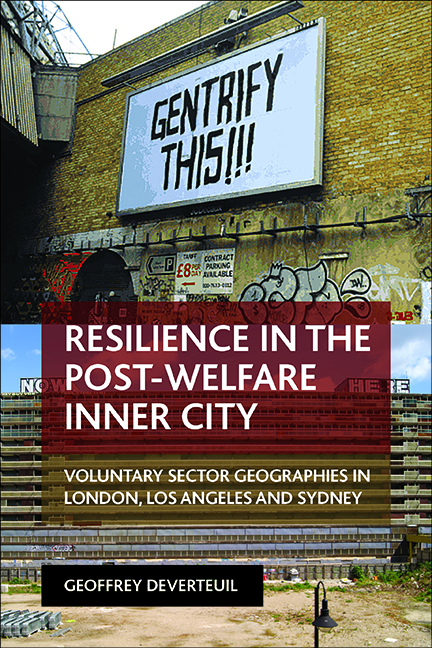 Resilience in the Post-Welfare Inner City
Resilience in the Post-Welfare Inner City Book contents
- Frontmatter
- Dedication
- Contents
- List of tables and figures
- About the author
- Acknowledgements
- Preface
- Part One Introducing resilience in the post-welfare inner city: conceptual and methodological considerations
- Part Two Case studies: spatial and social resilience in London, Los Angeles and Sydney
- Part Three Conclusions, critical resilience, commons and austerity
- References
- Index
three - The voluntary sector within the post-welfare city
Published online by Cambridge University Press: 10 March 2022
- Frontmatter
- Dedication
- Contents
- List of tables and figures
- About the author
- Acknowledgements
- Preface
- Part One Introducing resilience in the post-welfare inner city: conceptual and methodological considerations
- Part Two Case studies: spatial and social resilience in London, Los Angeles and Sydney
- Part Three Conclusions, critical resilience, commons and austerity
- References
- Index
Summary
As Chapter Two made clear, the (resilient) service hub pre-dates neoliberalism, but its primary agent and building block – the voluntary sector – is also deeply implicated in and influenced by neoliberalism. The voluntary sector owes some of its growth to neoliberalism while acting as a substitute for the Keynesian welfare state, unable to match the latter's scope, scale, coverage and universality. Rather, the voluntary sector is far more ad hoc, uncoordinated, asymmetrical and uneven, reflecting the vicarious nature of voluntary action and state support. So if the clustering of the voluntary sector in service hubs was Keynesian or even pre-Keynesian, the agents themselves have a complex relationship to both previous systems and the incompletely consolidating neoliberal one. The very complexity of this relationship animates two viewpoints on the voluntary sector: the dismissive, which sees it as a neoliberal stooge thoroughly enrolled in its projects, and the ambivalent to hopeful, which sees it as quasi-independent of the current governance structure, resilient and an important enabler of social resilience. This second viewpoint (which I favour) valorises agency, and in that respect I understand resilience as having a strong behavioural and adaptive aspect that further distances it from ecological and system-wide understandings (Bristow & Healy, 2014). This agency has led to very specific forms of spatial resilience and service hub geography, enabling both centrality and accessibility.
From the second viewpoint, the voluntary sector is distinguishable from the state by its independence; from the market by its emphasis on the non-profit principle, mutualism and altruism; and from the family/community by its formality (Milbourne, 2013). I do not see the voluntary sector as inherently (or exclusively) progressive/de-centred or co-opted into the ‘shadow state’ (Wolch, 1990) nor solely the means with which to absorb the most conspicuous shortfalls of the welfare system (for example, the ‘roll-back’ neoliberal argument). Along these lines, Trudeau and Veronis (2009) deemed the voluntary sector as a ‘translation mechanism’ that filters, if not occasionally deforms and restructures, welfare state policies and edicts into actual, on-the-ground service provision. Similarly, Elwood (2006) saw the voluntary sector as ‘strategic actors’ between the state and other local entities.
One common desire on the part of voluntary-sector organisations is to serve, though not exclusively, dependent and vulnerable people.
- Type
- Chapter
- Information
- Resilience in the Post-Welfare Inner CityVoluntary Sector Geographies in London, Los Angeles and Sydney, pp. 41 - 54Publisher: Bristol University PressPrint publication year: 2015


